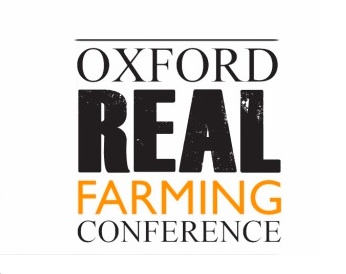There was passion and realism on display at this year’s Real Farming Conference, the feisty rival to the establishment Oxford Farming Conference. Michael Wale reflects on a tale of two conferences.
There were two farming conferences in Oxford during the first week of the year. The Establishment Oxford Farming Conference and the fringe alternative the Real Farming Conference.
It was at the latter that the Agroecology Alliance was launched, a grouping of like minded organisations to shift the political agenda towards agroecology. Particularly the research and development funding, as well as changing discourse of the debate on food production among politicians, public, food providers, public, food providers and researchers.
 Among the speakers at the launch were Helen Browning CEO of the Soil Association who admitted: “ I’ve been over the road today. The Soil Association has had a battering. As a farmer I know we still have a lot to learn, certainly in the organic movement we’re not there yet. There’s a lot to do. Let’s be honest about where our system is failing and is unproductive”.
Among the speakers at the launch were Helen Browning CEO of the Soil Association who admitted: “ I’ve been over the road today. The Soil Association has had a battering. As a farmer I know we still have a lot to learn, certainly in the organic movement we’re not there yet. There’s a lot to do. Let’s be honest about where our system is failing and is unproductive”.
“As a farmer I know we still have a lot to learn, certainly in the organic movement we’re not there yet. There’s a lot to do. Let’s be honest about where our system is failing and is unproductive”
Pete Riley, who leads GM-Freeze is one of the leaders behind the new Association, who fielded speakers from Coventry University and Nic Lampkin, head of the Organic Research Centre.
Riley told me : “ In the IAASTD report in 2008, which included the World Bank, the UN and 400 agronomists looked at the evidence and decided it could not be business as usual, and that we should adopt agroecology. Visible attempts to implement the report is in great danger of being eclipsed by the concept of ‘sustainable intensification’, the latest attempt to present out-dated, unfair and highly damaging forms of intensive agriculture in a better light”.
Miguel Altieri, a professor of agroecology at Berkeley, the University of California, sent a message of support. He defines the five main principles of agroecology as recycling of nutrients, building of soil organic matter, minimising losses from the system, maximising biodiversity and genetic diversity, and enhancing biological interactions.
The Oxford Farming Conference was hell bent this year on promoting the cause of GM, from the opening utterings of DEFRA Minister Owen Paterson to the awful ‘confession’ of Guardian writer and author Mark Lynas, who brought roars of approval when he confessed to discovering science and giving up his previous anti-GM campaign, that included trashing a crop. His ‘scientific’ beliefs were later challenged by… scientists. Not only in Britain, but America. Beware! Lynas is now an avowed climate change campaigner.
Interestingly, the alternative conference guided by the writer Colin Tudge and wife Ruth West, encourages discussion, as much as speeches, and one of the most crowded and vociferous was Riley’s appearance to argue against GM!
Riley told me later about the Association and what it might achieve : “People are thoroughly cheesed off with the blinkered and myopic approach of Westminster and some of the research institutions. We’re in a pivotal position, there are certain moments in history when the populace has to take over. This is why we need to pull things together”.
“People are cheesed off with the blinkered and myopic approach of Westminster and some of the research institutions. We’re in a pivotal position, there are certain moments in history when the populace has to take over”
Nic Lampkin added : “ Agroecology is the thing we need to bring forward. What’s the point, for example, of getting wheat yields up to 15 tonnes if we are feeding it to animals.”
Michael Wale











